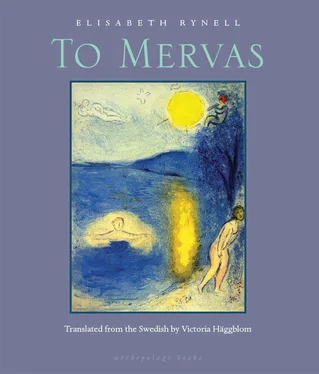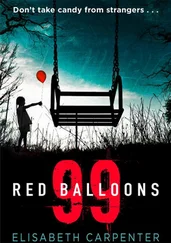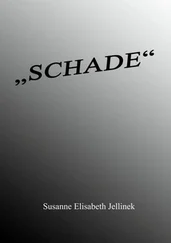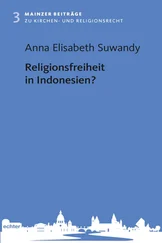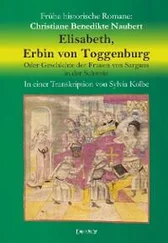I regarded my body as a repulsive feral animal, and I tried to keep it at a distance. I still remember how I tried different ways of moving so I wouldn’t feel my clothes against it; I couldn’t stand feeling how my body stuck to me and sort of groped me. When my classmates arranged dance parties, I never went; dancing seemed gross, and I wrote a lot about that in my diaries. Girls who wore makeup, miniskirts, or tight clothes I secretly considered sluts. If one of those girls addressed me in school, I turned away demonstratively. It was as if they carried a plague, those who danced and wore makeup and dressed up, a corporeal plague I had to stay away from at all costs.
It was harder to protect myself from my own body, and the plague that it spread. I got my period early, at twelve, when I’d just arrived at my grandmother’s, and the smell rising from my blood-soaked pad was enough for me to understand that everything originating in the lower regions of my body was appalling. To be neat and live secluded in the ordered world I’d created around myself was my protection. Black water lapped underneath that order, deep as an abyss one could fall headlong into. My life was either/or, order or chaos, so I had to be very stern and careful, and for years I kept refining my sense of order, all through high school. At twenty, I was firmly determined to live the rest of my life as a virgin. I would devote my life to study and perhaps later in life some big research project; marriage and children were something I never even considered. I was twenty-two when I met Kosti, and he just laughed at me when I explained my position. It wasn’t a scornful or mean laugh, but glittering, almost loving. I was completely disarmed and felt incredibly relieved.
“You,” he said. “You want to be loved. From all the way in here.”
He pushed his index finger deep into my belly button and I stood still as if paralyzed, drinking the joy that bubbled like sparkling water from his eyes. Later on, when we’d known each other for a while, he teased me and asked if I wasn’t willing to share my virginity with him.
“Just a tiny bit,” he pleaded, “so I can become a virgin too!”
He didn’t call me Marta, but Mart, and he said it with a pronounced “r” and a soft “t.” You might say that he made me into Mart, that he came and opened and released me from Marta.
We studied archaeology together. In the summers, we excavated and traveled. We were inseparable. Sometimes we got upset with each other and argued, sometimes we had nothing to talk about, but we were always together, we were meant to be together; it seemed our connectedness would never end. It was during the last year of our relationship that I became obsessed with the idea of having a child. I wanted a child with Kosti, immediately. But he didn’t, not yet.
“I want to turn thirty first,” he said. “Then we’ll have kids, plenty of kids.”
Even though he didn’t quite understand it, Kosti probably knew that our conflict was about something besides having children. It was the old fear, the fear of the plague that had risen inside me again. I wanted to protect myself against something, but I didn’t know what it was, and I grew desperate. We lost sight of each other, perhaps also got scared of each other; at any rate we were suddenly moving in different directions. I was twenty-nine, and so was Kosti. He went on the yearlong trip to the Orkney Islands by himself. It was a trip we’d planned to take together.
“I’m not coming with you unless you’re willing to at least try to have a child with me,” I’d said. Because I still didn’t think he was capable of leaving me and I didn’t want to accept the seriousness of what had come between us: my life, my entire life.
He left. And a year later, the boy was born. Kosti didn’t contact me that entire time. Not until he had returned from his trip did he call, and I told him about the boy. After that, he wrote and called a few more times, more and more rarely. Then, silence. I never went looking for him. He’d moved to another part of the country, that’s all I knew. The way I looked at things then, I viewed him as having mortally wounded me, first and foremost by not being the father of, I almost want to say, our child. He’d left me and my life now belonged to the boy, now it was the two of us who were inseparable. I often found myself thinking pointless things, such as that if Kosti had been the father of my child, he would have been healthy. It was as if my mind refused to complete the thought that if Kosti had been the father, the boy wouldn’t have existed at all. I knew, technically, that the boy had a father, and that Kosti wasn’t him. But I never truly accepted that reality. The way I saw it, the boy was fatherless. That was Kosti’s betrayal of both of us.
I’d become a mother, but my child was locked away in the hospital and couldn’t come home with me; he cried incessantly day and night; he almost wasn’t a real child, and I was his mother. That’s how it was. For one year my boy lived in the hospital and I was there with him, sleeping on a cot in his room the first few months, living inside his crying as if inside a cave of hoarse, exhausted crying. Back then, no other world existed except for the one contained inside the hospital’s red bricks. I had to subscribe to that world and its routines, routines that made the days so similar they eventually seemed like one, like a simple, rhythmic pattern repeated again and again, a ticking without variation that kept the world going. No suffering or pain can resist being swallowed by a hospital’s regulations and stubborn reasoning. An ingenious protective net of cleanliness and restraint is perpetually suspended over the abyss. It wasn’t until I was locked up inside this alien order that I began to understand what the pedantic rhythm in my own life had been about. You can think of order as a spine or a corset; that’s how I used to think about it myself. Now I know that its primary purpose isn’t to hold things together. It is to shut things out, to repel and shut things out. That’s what it’s for.
I sat there with my child, enclosed by the hospital’s vast order, surrounded by the small cell filled with my tears and the face of my child. I felt as if I were traveling on board a spaceship drifting off course through the universe. All connections to my old life — my history, my memories, my sense of context — had been severed. After three months, the doctors convinced me to move back home. I had to get some sleep, they said. I had to get my life back in order.
“I don’t have a life without the boy,” I said. “I have no life to take care of.”
Nevertheless, I staggered out of the hospital and my sister came to bring me home. She’d been watering my plants, opening my mail, and paying my bills while I was gone. Now she led me into town, led me out under the incredible, enormous sky, and all the way to my small apartment, where my old life lay wrapped up, waiting for me. She’d prepared a welcome-home dinner and bought wine. On the table was a bouquet of Easter lilies, and outside the kitchen window, the leaves were opening on the birch. At once, I became aware that it was spring, late spring. I sank down on a chair by the table and stared out at the birch, massive tears welling up inside me. A gray mountain of tears.
“I’m like the boy,” I moaned. “I just cry and cry — ”
I tried to laugh a little, but it wasn’t possible. Instead, my laugh turned into a bawl, a long bawl growing out of my mouth like a plant, the stem of a plant. I couldn’t breathe; it felt as if my bawling would suffocate me. It was a sea of sound filling every part of me; I ran from the table, threw myself on the balcony door, and tore it open. My sister was right behind me, yelling and pounding her fists against my back; she held me, and I felt the cramping subside; I could breathe again.
Читать дальше
